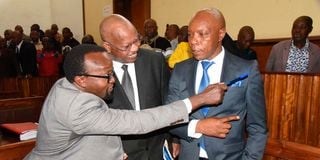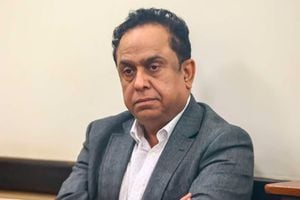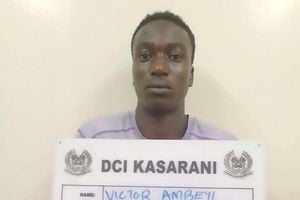
Maina Njenga with his lawyers Ndegwa Njiru and Harum Ndubi at the Nakuru law court on November 20, 2023.
Cases involving a businessman sought for 15 years and a former Mungiki leader are the latest among 1,000 dropped by Director of Public Prosecutions (DPP) Renson Ingonga.
The termination of the case against Mr Yagnesh Devani, who fled the country in 2009 until January this year when he was extradited to Kenya by the UK, is the latest shock by the DPP.
Mr Devani was wanted over Sh7.6 billion petroleum products scandal. After the Directorate of Criminal Investigations (DCI) and Ethics and Anti-Corruption Commission (EACC) fought to have him returned, the DPP withdrew the case two weeks ago, citing lack of witnesses.
Tens of millions of taxpayers’ shillings had been spent to have him stand trial for one of the largest corporate fraud cases in the country. The director of Triton Petroleum Company Ltd is now a free man, hardly a year after landing in Kenya.
Deputy Director of the Department of Prosecution and Training Institute, Aloys Kemo, said cases were dropped to stop the loss of taxpayers’ money.
“The withdrawal is not strange. It is only that we focus on cases involving high level persons,” Mr Kemo said.
Other cases that have been withdrawn are one against former Mungiki chief Maina Njenga, a Sh8.5 billion suit against former Tourism CS Najib Balala, a Sh2.5 billion tax evasion case facing businesswoman Mary Wambui and her daughter Purity Mungai, Sh7.3 billion corruption charges against then-Deputy President Rigathi Gachagua, a Sh19 million corruption cases against former Gender and Public Service CS Aisha Jumwa and corruption cases against former Kenya Power boss Ben Chumo and ex-NHIF chief Geoffrey Mwangi.
The court was informed the prosecution did not have witnesses and evidence to support the case against Mr Devani.
The case was registered in 2008 when the businessman took refuge in the UK. The DPP applied for extradition orders, which were issued by a court.
Mr Divani remained in the UK for 13 years, seeking to set aside the extradition order. He was returned to Kenya on losing the case.
Early this year, Mr Devani was charged with obtaining Sh7.5 billion from companies trading in fuel.
Last month, the Office of the DPP and EACC clashed over the withdrawal of a case at the request of the accused.
The case involving Tanathi Water Works Development Agency CEO Fredrick Mwamati and 11 other people centred on the tender for the construction of Sh292.7 million Kinanie Leather Industrial Park Water Supply.
The EACC concluded investigations on December 14, 2023 and recommended the prosecution of Mwamati, senior officials and three companies involved in the said fraud.
In June this year, Mr Ingonga directed the arrest and prosecution of nine people and the directors of PERMA Structural Engineering Ltd, Antidote Agencies Ltd and Kyasi General Merchants Ltd.He recommended nine charges, including conspiracy to commit corruption, abuse of office, failure to comply with procurement laws, conflict of interest and unlawful acquisition of public property.
However, the DPP withdrew the case last month. EACC said the case was withdrawn following a request from the accused to have evidence reviewed. It added that some individuals got kickbacks.
The DPP withdrew the case against Mr Njenga on November 10, citing lack of cooperation by 20 of the 28 witnesses.
According to state counsel Charles Omwenga, witnesses were not willing to testify due to their ties with Mr Njenga. The other reason was failure by police to book suspects.
The case followed the May 2023 raid on Mr Njenga’s houses in Nakuru, where eight people were arrested for reportedly being in possession of firearms and planning crimes.
Mr Ingonga withdrew the case against Mr Balala and 16 others on August 12, 2024. He said the action was in the interest of justice and the need to avoid abusing court process. The DPP added that the case had gaps, which EACC failed to address.
On March 28,2023 the DPP withdrew a corruption case against Ms Edith Kimani.
Ms Kimani had been charged alongside nine others over a Sh7.9 million tender.
During the ODPP Open Day in Nakuru County, Kenyans expressed reservations with Mr Igonga and his juniors over the huge number of case withdrawals.
The civil society, including Transparency International-Kenya (TI-Kenya) and the Kenya Human Rights Commission (KHRC), has taken issue with the DPP’s actions.
The organisations say the ODPP, which has been called out by the EACC, judges and magistrates for withdrawing cases and decisions to charge, is the weakest link in the justice system.
“We are concerned by the disturbing pattern of withdrawal of high profile cases,” said Ms Sheila Masinde, the Executive Director TI-Kenya.
She said the ODPP should be taken to task for abuse of the law and taxpayer resources.
“In line with Section 35 (3)(c) of the Judicial Service Act, the Chief Justice, should initiate an independent inquiry and judicial review of corruption-related cases withdrawn by the ODPP and those in which the accused have been acquitted but magistrates and judges have called out the ODPP for dereliction of duty leading to prosecution-aided acquittals such as in the Sh63 billion Arror/Kimwarer case,” Ms Masinde said.
She added that some civil society organisations, including TI- Kenya, have taken the Arror/Kimwarer issue to court, seeking to hold prosecutors individually liable for having declined to interrogate witnesses.
“A judicial review of the collapsed cases is crucial to ascertain if the withdrawal was conducted transparently. By examining the circumstances and reasons behind the withdrawal, public confidence in the justice system can be restored and the principles of accountability and the rule of law upheld,” Ms Masinde said.
KHRC also faulted the ODPP and suggested that EACC be given prosecutorial powers.
“This would make taking legal action smoother and help in handling corruption cases more effectively. The move would enable EACC officers, often at the forefront of corruption investigations, to directly prosecute matters, thus reducing the likelihood of conflicting decisions among investigators and prosecutors,” KHRC said.
“The gazettement of qualified EACC officers as special prosecutors should be considered.”
Nakuru Human Rights Network Director, David Kuria, said withdrawing high-profile cases is detrimental to the fight against corruption.
“It poses grave danger to the rule of law. The DPP often says the cases have gaps. His office should resubmit the case files to the investigating agencies to seal the gaps but not withdraw them,” Mr Kuria said.
“If a prosecutorial counsel bungles a corruption case, the court should lift the immunity of such prosecutors and hold them liable. This will stem the tide in the rising pattern of recklessness in handling serious matters.”
Mr Kemo defended withdrawals, saying some cases were filed many years ago.
Mr Kemo, who addressed legal experts, judicial officers, law students, policy makers, departmental heads and the public, said the decision to withdraw some cases is aimed at saving taxpayers’ money.
He added that lack of evidence is the other reason for the withdrawal of the cases.
“Evidence in the cases withdrawn could not sustain the charges. Those indicted were likely to win and sue the government for compensation,” he said.
“Before a case is withdrawn, there is assessment on its viability and the reasons must be convincing to the court. There have been instances where the courts have declined the withdrawal of some cases because the reasons given by the ODPP were not convincing. We do not withdraw cases for the sake of it.”
He said the ODPP has no ill motive while withdrawing cases.
“When the ODPP realises a case will lead to an acquittal under section 210, where the court will say there was no evidence and when such a person is freed and he moves to civil court to claim damages, you can be sure it can be millions of shillings,” Mr Kemo said.
“We cannot play a passive role and prosecute every matter presented by an investigative agency. One of the cardinal duties of a prosecutor is to ensure facts are placed before court, hence the need for constant reviews. The decision to prosecute is one of the most important aspects in the criminal justice chain. It is weighty and cannot be left to the hands of an investigator.”
Changing circumstances
He added that the ODPP is not a conveyor belt. According to Mr Kemo, the ODPP has done well in prosecuting cases touching on high profile individuals.
He explained that witnesses may lose interest in a case or some may die, leading to the withdrawal.
“In some cases, complainants declare they have no interest in the case. They reconcile with the accused and never want to proceed with the matter,” Mr Kemo said.
He added that the office has in the past withdrawn cases after considering circumstances under which a person was charged. He said the circumstances may change over time due to public interest or other factors.
He said the ODPP can withdraw a case in which witnesses give contradictory evidence.
“In such a situation, the public prosecutor does anticipate losses resulting from time and resources,” he said.
He dismissed reports of the ODPP only withdrawing cases of high profile individuals.
The Constitution allows the DPP to discontinue a prosecution with permission of the court.
It says the DPP can “discontinue at any stage before judgment is delivered in any criminal proceedings instituted by his office”.










